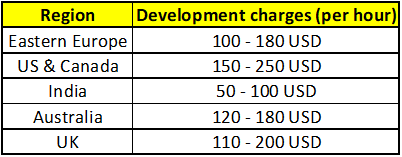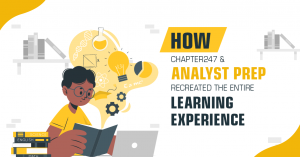Perhaps the only thing that is constant is the evolution of technology.
Yes! Technology is ubiquitous with its presence even in those places where we did not imagine it to be a few years ago. These are the times when technology is evolving for technology’s sake. Industries worldwide are accelerating the use of technology not just to improve processes but also to save costs. The education sector has always been open to the idea of changing patterns of pedagogy. Technology has to date played an important part in delivering learning materials across learners. It provides flexibility, analysis, and the required teacher-attention at par and in some cases more than the traditional modes of teaching.
Presently, the trend of mobile applications as part of eLearning solutions is catching up. Every eLearning organization wants to provide its learners with learning material on the go. Our world is full of apps that are managing every aspect of our lifestyle. In the education sector too, the growth of mobile applications has been exponential due to the ease of learning and convenience it offers to learners. With 24/7 access students can learn anything they want to. Not just that, eLearning apps will enable learning in the same manner you do with your eLearning portals or web applications. Technologies like AI, ML, and AR/VR have contributed immensely to a great learning experience even with educational mobile apps.
Amazing stats about eLearning
 Source: Gminsights
Source: Gminsights
- In 2018 the overall global eLearning market was valued at $190 billion but it is the same study that has ascertained that it is expected to reach almost $350 billion by 2025.
- Close to 51% of smartphone users today have at least one e-learning application installed on their phones.
- Out of the plethora of apps that are installed by smartphone users, m-learning apps are the 3rd most popular ones.
- 64% of the users believe that accessing educational content from their mobiles has been very useful.
Other statistics point out that the global market for m-learning apps in 2016 was $165.36 billion which is bound to touch $250 billion by 2022 and now with COVID-19 calling the shots, reaching the figure might not be a distant target.
How does e-Learning mobile app work?
Consider the case of an e-Learning mobile app specifically built for educational purposes. To build a mobile application, four types of users will be considered and each will have a specific purpose. Let’s discuss the same
Students – The apps are being built for learners and they are the end-users of the app. The application either can be specific to the school or could be a stand-alone application having a repository of courses for the students to select. In either of the cases, the student has to feed in relevant information to get started with the application. The relevant course materials, assignments will be a part of the m-learning app.
Parents – Not all eLearning mobile applications have parental logins or use. But for smaller classes, parental logins become necessary as the child might not be able to complete the due diligence process. For stand-alone eLearning mobile applications, there is no need for any parental login.
Teacher – A teacher’s role in the app is the most important as they are the ones who will be uploading the content, accessing the assignments of the students, giving them feedback, and a lot more. It is around the teacher and the student that the entire model will be designed.
Super Admin – the role of the super admin is to manage users and have control over every activity of the app. The super admin will have access to those parts of the mobile learning applications which will not be accessible to any of the other users. They will be able to view details such as overall active users, time spent by users, features that are often used, income generated, and so on.
The need to invest in mobile learning applications
You could be an e-learning start-up or you could be an old player in the education sector but want to develop your own application. If you already have a web application but do not have a supplementary mobile application, then you are losing big on a trend that is in most demand. By building a mobile learning application, you can upload good quality educational content created by your tutors. The students can take advantage of the material from any location, any time. To develop and build an expert eLearning mobile application solution, reach out to us for getting a custom e-Learning app solution for your business. We deliver a wide range of educational IT software like e-learning, mobile, web applications, educational AR/VR solutions, SIS, and so on.
The need for eLearning mobile applications is justified with the benefits it gives:
- A complete cost-effective solution
- Easy accessibility, with productive learning opportunities
- Flexible learning opportunities as it is a great tool for learning on-the-go
- 24/7 accessibility to educational content
- Detailed educational content available in the form of videos, books, FAQs, assessment topics, and a lot more.
- It becomes easier to track the progress of the course whenever you want
- Detailed reports can be extracted about the performance by just accessing app open and getting the requisite details
- Interactive learning via quizzes, games, and videos is also possible without any fuss even on a miniature application like a mobile application.
- With eLearning applications, users can learn with podcasts, videos, and audios on smartphones.
- Content is presented in a concise manner making it relevant for the learners. As a result, the engagement rate is higher leading to a brighter chance of on-time completion.
- Apps also have embedded online communities which results in a collaborative learning atmosphere for the students.
- eLearning mobile application development also implies multi-device support
Key features that should be a part of the eLearning app
Video-based content – Elearning applications on mobiles is one such platform where the students can view as well as listen to pre-recorded lectures or module-wise lessons delivered by instructors. Students in this manner can get easy access to the classroom at any time of the day. Students within the application feature can zoom in a particulate image, go ahead with the video or even go back if you are not able to understand a particular thing. Video-based content is the turning point of the educational app industry as the demand for it is very progressive.
Live Tutorials and interactive sessions – It is important that even the mobile application should give the feel and look of a regular web application allowing you to host interactive live sessions as well as guided tutorials to hone their skills and concepts. Live tutorials give the students the opportunities to have live interaction with instructors and can ask queries. The mobile application can also have a ‘chat now’ feature where communication can happen on an immediate basis.
Bulletin Board – For boosting the motivation of the learners, integrating bulletin board functionality as a tool will be a great move.
eCommerce – By implementing this, the app’s effectiveness increases. Learners can purchase premium video lecture books and other learning products within the application.
Push Notification – Notifications play a huge role to determine the success of the eLearning mobile application. The learners can be updated on new videos, or material posted. They can also be informed about any special session or activity that the tutor might be planning for the students.
Payment integration – Payments can be made in a hassle-free manner when the application has multiple-payment options.
Tests and quizzes – Learning is incomplete without tests and quizzes, else there will be no way to understand how a student might be performing. It is not necessary that a student might have access to the web application as they might not possess a laptop or a PC. In such cases, your education app must offer a section where mock tests and quizzes are presently based on the modules. The students on their mobiles themselves can test their knowledge and understand from their performance if they need to focus on that topic more.
Offline mode in an app
Having a robust internet connection can be a challenge especially when your learners are located in distant rural areas. The application must be designed in a manner that it proffers offline mode and the ability to download the modules.
Gamification
eLearning mobile applications are very important to attract maximum users for great UX. Research has shown that students have a fascination with gamified forms of learning and test-taking. Hence including gamification in the digital classroom with digital badges can be a great idea. Badges also motivate students to overcome challenges. Gamification assists in the cognitive development of a student and increases engagement with the eLearning mobile application.
Real-time Analytics
With this feature, students, tutors, and parents can get a hold on e-learning insights and performance reports. Real-time assessment scores, assignment completion time, assignment scoring, etc can be added in the mobile app’s analytics functionality.
These features will give your app a strategic advantage but there are some other features that are a must-fit for every eLearning app. We have divided the features based on user type.

App Monetization
Advertisement: There are 3’rd parties that can be contacted for advertisement on your app. For every ad click, a commission fee can be charged from the advertisers.
Subscription/ Premium: If you decide to launch a premium version of your app to start with a subscription-based service, users will pay to access the advanced features and functionalities. For instance, readable content can be offered for free but if students want to access videos or participate in webinars they have to pay for it.
In-App purchases: In-app purchase strategy is a useful monetization strategy in which special courses or study materials will be chargeable.
Factors that affect the cost of the app
With everything said above, there are some key factors that will have an impact on the cost of the eLearning app.
App complexity: The more the number of features, the higher will be the cost. In order to make your app attractive, you have to add features and functionality, but there has to be a right balance between it. If you only require basic features then your app will cost less.
UX/ UI: If you require an advanced eLearning app, with a lot of graphics and animations, the costs will shoot up. But that doesn’t mean that you will not pay attention to this aspect because it is a crucial factor that will heighten the performance and engagement of the app.
Platform support: The cost of an Elearning app also is directly proportional to the targeted platform because it can support Android, iOS, or even both.
Development location: The total cost of the app also depends on who is developing it. The geographical location of the eLearning mobile application development company will have a great influence on the cost. The below-given comparison of costs will give an idea.

Team structure
In order to build the app, we have also listed the minimum team required to build it the way you want it. As an experienced custom software development company, we believe that if the complexity of the project increases, the number of professionals also will increase. Assuming a moderate level of complexity of the eLearning app, we present the team which we will have for your application development.
- A Project manager (1 member)
- UI/UX designers ( 1 to 2 members)
- Team leaders (1 to 2 members)
- Programmers (2- 3 members)
- Quality analysts (1 to 2 members)
How much will it cost
The overall cost of building an e-Learning app with moderately complex functionality and inclusion of requisite features for a single platform will range between $10,000 to $30,000. If you are going for an advanced eLearning application with CRM integration etc, it might cost anywhere between $35000 to $70,000. The final cost of the application will vary in accordance with location, features, and complexity. But this is a rough picture which we hope helps.
Choosing the right Elearning mobile app development company is important
In order to build a fully-functional and innovative eLearning app, it is important that you partner with a reliable mobile application development company like Chapter247. With our expertise and a reliable experienced team, you will get the best solution based on your budget and timeline. Drop us a message to get a customized eLearning software solution for your business.
Let the ideas roll!








